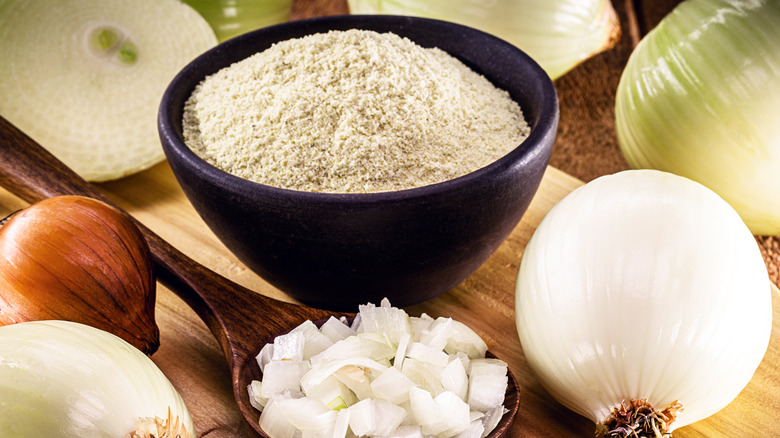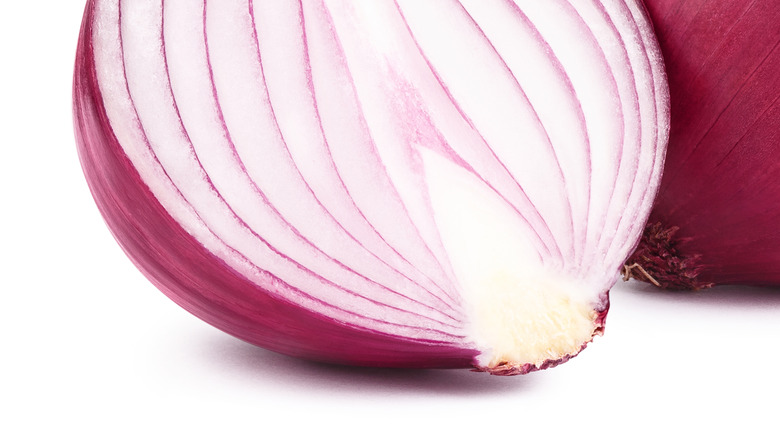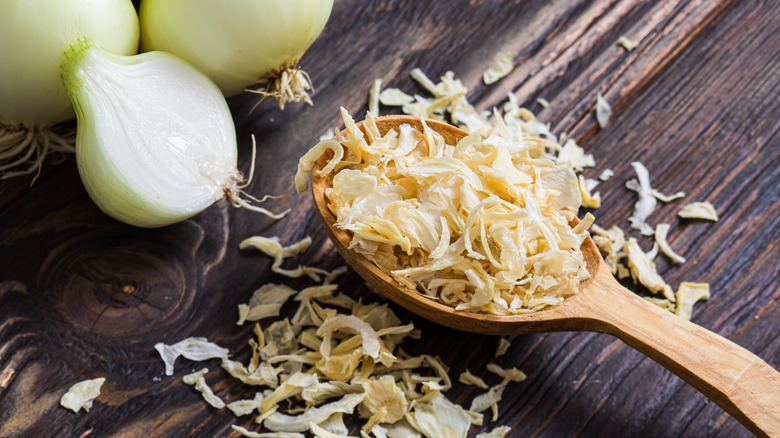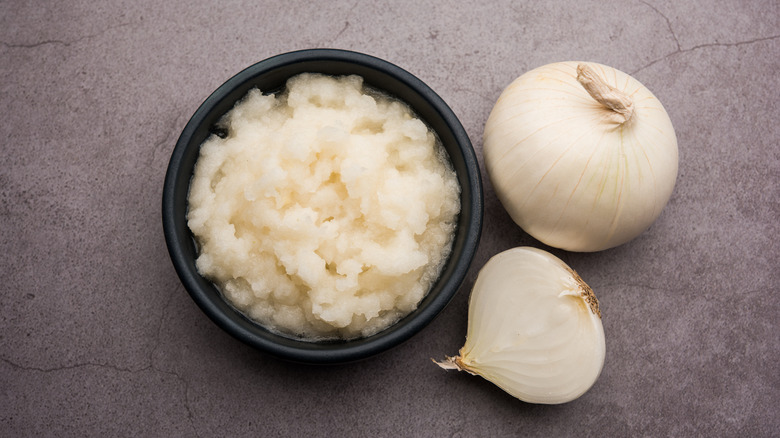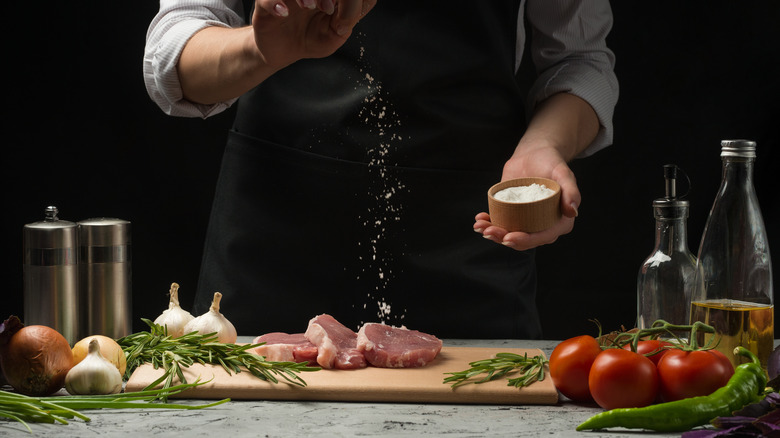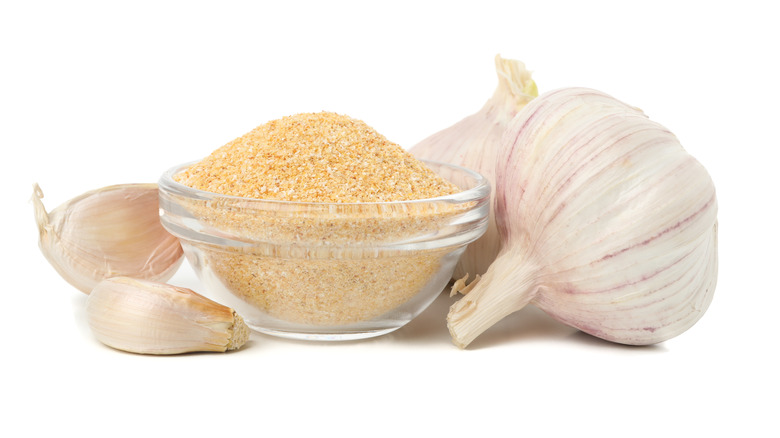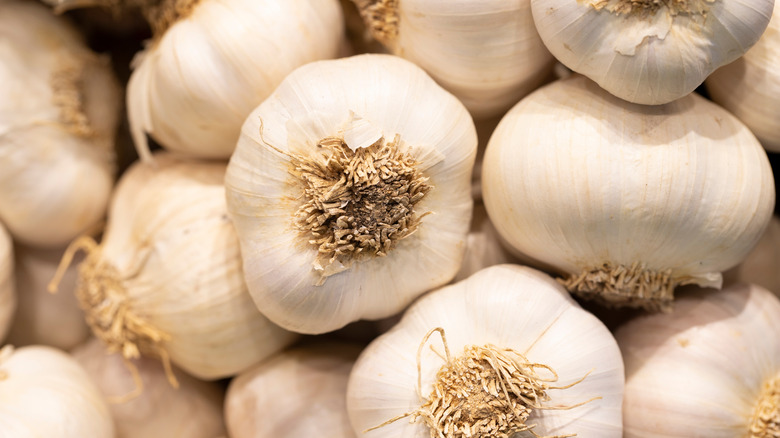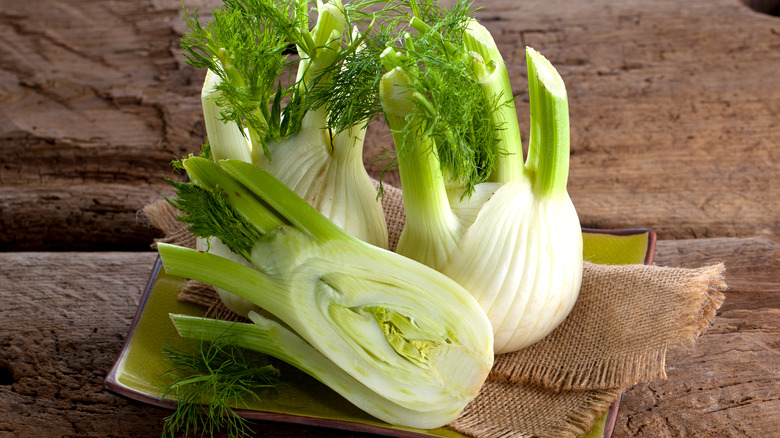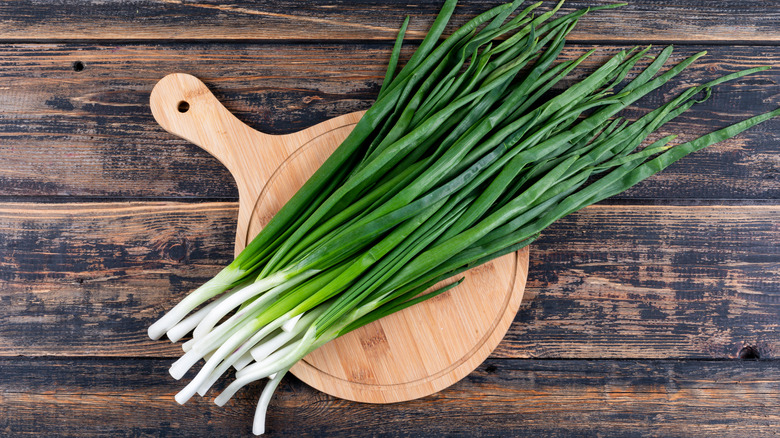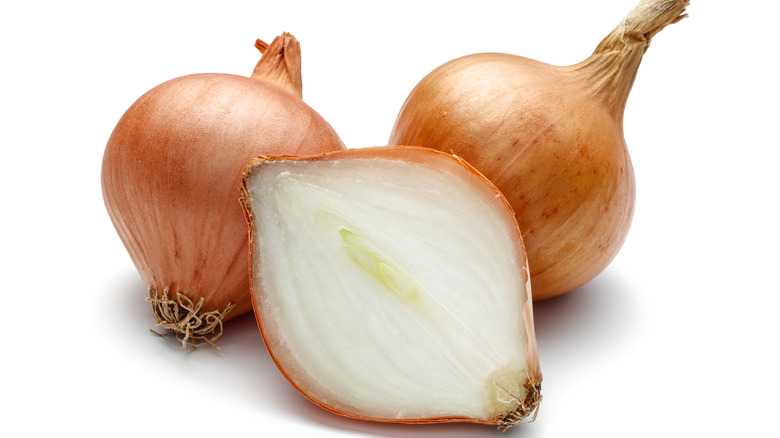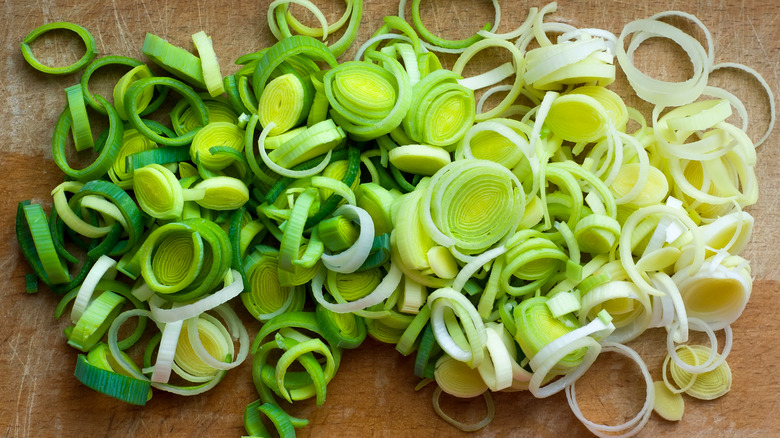10 Best Substitutes For Onion Powder
It may be an obvious solution to substitute onion powder with fresh onions when a recipe calls for the former and you run out. After all, the powder is made from dried, dehydrated, and ground onions. However, according to Bon Appétit, the powder stands all on its own and offers unique flavors that the fresh kind cannot wholly substitute.
Because the powder has no texture and no water (since it's been ground down), it has a more concentrated flavor. Further, rather than being made from the entire vegetable, the powder can be created by utilizing particular parts like the stem, root, or the skin. It can also be dry roasted before being ground, which gives it a distinctly nutty, roasted, and umami flavor.
In essence, onion powder adds a potent flavor that is hard to replace, and for that reason, A Couple Cooks recommends not replacing it at all, if possible. If you do happen to find yourself in a sticky spot with no option but to hunt for a replacement, there are ways to substitute onion powder with these 10 swaps.
1. Fresh Onion
The handiest and most obvious substitute for onion powder is using fresh onions. However, there are a few things to keep in mind when doing so. For one, fresh onions will add moisture to your dish, which onion powder will not do, so drying the onion out as much as possible before using is key. There's also the possibility of fresh onions turning into a mushy mess if they're overcooked, so keep an eye on the cooking time and temp. The other thing to note is that onion powder is far more concentrated in flavor than fresh onions and is about three times as potent (via Hungry Huy). So, you're probably going to need a lot of fresh supply to replace the taste of the powder, and adding in additional seasonings might be necessary.
It's not all bad, though. Adding fresh onions gives you the freedom to choose the type of onion you want to use in your recipe (red, yellow, white) and determining which parts of the onion you want to add and which parts you'd like to discard. As well, fresh onions can add a delicious crunch to your dish that would otherwise be lacking.
For the best results, use 1 cup of chopped fresh onion to substitute 1 tablespoon of onion powder and build from there to achieve the desired taste.
2. Onion Flakes
Onion flakes are tiny flat scraps made from minced and dehydrated parts. Because the flakes are essentially dehydrated onions, similar to the way onion powder is made, it is the closest substitute you can use. Just like onion powder, flakes too have a more concentrated flavor, except they're larger in size and will therefore add more texture. You could also turn onion flakes into a fine powder by blending them in a food processor or with a mortar and pestle.
Onion flakes make an excellent substitute in salads, casseroles, and stir fries, especially because they add a flaky mouthfeel that is a pleasant addition. When using onion flakes while cooking, it's best to note that they may dry out your dishes more than you want them to, so you might need to add in a bit of water or oil to give the dish some more moisture.
You can use a 1:1 ratio to substitute onion flakes for onion powder in your recipes.
3. Onion Paste
Onion paste is a thick spread made by pureeing fresh onions. It can be super easy to make at home, and doing so is a great way to utilize those half-cut leftovers just sitting at the back of your fridge.
To make it yourself, says Gourmet Sleuth, all you need to do is roughly chop unpeeled onions and blend them until they reach the consistency of a smooth paste. Then, pour the paste into an ice cube tray and cover it with plastic wrap (which will keep your entire freezer from smelling like onions). Once the cubes have frozen, you can remove them from the tray and store them in a ziplock bag in the freezer until you're ready to use them.
The frozen cubes will last for quite a while so you can always have an onion powder substitute on hand. Make sure to thaw completely before you use it unless you're adding to soups and stews — in that case, you can pop them straight from the freezer into the heated mixture.
When thawed, about 2 to 3 tablespoons of onion paste can be used to substitute 1 teaspoon of onion powder.
4. Onion Salt
As seen above, there are tons of onion-based substitutes for the powdered version, all with a similar flavor and pretty clean substitutions. Onion salt is another great one, as it's simply onion powder with the addition of salt. So, it's a no-brainer this could be a near perfect swap. Onion salt contains no fat, calories, or cholesterol. It can, however, increase your daily sodium intake. Since this ingredient already has salt in it, be sure to tweak the amount of regular salt called for in your recipes so as to not end up with an overly seasoned plate of food.
Onion salt can be added to just about any dish that you would add the powder to, particularly eggs (scrambled or omelet), marinades, stews, and soups.
For the best results, use a 1:1 ratio for this substitute.
5. Garlic Powder
Since garlic powder has a similar texture to onion powder, it makes another great substitute. However, A Couple Cooks cautions that garlic powder might provide a bit of a different taste in the final dish. It reasons that fresh onions, onion flakes, onion salt, and onion paste are all made from the original source and, therefore, are similar in flavor — using any of them in place of onion powder won't comprise the taste of your final dish.
Garlic powder, on the other hand, has a slightly different flavor so some adjustments might be needed. But both ingredients are quite pungent and have similar profiles, so if you love the taste of garlic, this replacement is a great pick.
For this swap, the suggested replacement would be to use half the amount — so a half-teaspoon of garlic powder can be used for every one teaspoon of onion powder.
6. Garlic Salt
Just like the constitution of onion salt, garlic salt is a mixture of powder and salt. Since this ingredient also comes in a powder form, its texture is similar to that of onion powder except that the latter is a tad finer in grain size. Garlic salt makes for a great substitute alongside other seasonings in rubs. You could also use it in stocks, soups, pastas, and casseroles.
Similar to the onion variety, garlic salt naturally has a pretty high amount of salt in it — with the ratio being as high as 3x the amount. This means that this ingredient is also high in sodium, so if you're following a diet that tries to cut down on this additive, it might be better to stick to other substitutes. It's also best to account for the natural seasoning in garlic salt when making dishes and adjust the amount of regular salt called for in your recipes.
To substitute onion powder with garlic salt, use half the amount — so a half-tablespoon of garlic salt for every tablespoon of onion powder.
7. Fennel Bulbs
Fennels bulbs may be far from what you'd think of when it comes to a worthwhile substitute — they nowhere near resemble the texture of onion powder. But fennel bulbs can, in fact, be used as a replacement. They're just as aromatic, flavorful, and bittersweet. And fennel bulbs also may have some health benefits that make them great additions to your dishes. According to Healthline, the bulbs are highly nutritious, and may be able to improve heart health, reduce inflammation, and help curb appetite.
When used raw, fennel bulbs can be quite crunchy, so if that's not the texture you desire, it's best to use them for cooked dishes like soups and stews and flavoring meat, chicken, and vegetables where the cooking process will make them silkier and softer.
To substitute, use 1 teaspoon of minced fennel bulb for every half-teaspoon of onion powder.
8. Scallions
Scallions — also known as green onions or spring onions — have a flavor profile quite similar to that of an onion so they can be used as a great replacement. Scallions have a long green stalk and white onion-like bulb at the top, all of which are edible. While scallions may be sweeter than onion powder, they do have the benefit that they can be eaten both raw and cooked. This means you'll have the freedom to add raw scallions to salads, dips, pastas, and pizzas or cook them in soups and protein dishes.
When using scallions in place of onion powder, it's important to consider that the former has a more subtle flavor and you might need to add more of them to meet the requirements of onion powder in your recipe. Another important thing to note is that scallions are perishable and will only stay fresh for a couple of days so you can't stock up on them as you would with other powders and salts.
For the best results, add about three times the amount of scallions to substitute onion powder in your recipe — from there, you can always adjust to taste.
9. Shallots
Shallots look strikingly similar to onions, and they are often mistaken for one another. That's because shallots belong to the same group of alliums as onions, scallions, and garlic and are, therefore, a great substitute for onion powder. The Daring Kitchen describes the taste of shallots to be a mix of sharp, sweet, spicy, and acidic flavors. The website also suggests that shallots have a flavor similar to onion powder, except it's not as strong and obvious.
Minced shallots can be used to make stir fries and casseroles and can be added to salads and tacos as well. Whole shallots also have certain health benefits that ground onion powder does not with more fiber and protein, plus potassium and magnesium, among other vitamins.
For a good replacement, use two minced shallots for every tablespoon of onion powder in your recipe.
10. Leeks
Leeks belong to the same family of alliums and also can be used as a great substitute for onion powder. They're quite similar to scallions in terms of their appearance — both have a long green stalk and a white bulb at the top. The green stalk of a leek is only slightly longer which makes it look a little bit different.
While the taste of a leek can vary from that of a scallion, they are actually quite similar to onions in terms of taste. Whole leeks are also known to be full of nutrients and may have health benefits, unlike onion powder, which has been ground. Using leeks in your recipes may help reduce inflammation, improve heart health, promote weight loss, ease digestion, and apply cancer-fighting properties, according to Healthline.
For the suggested use, swap in one cup of raw and minced leeks for every one teaspoon of onion powder that's needed.
